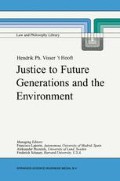Abstract
I now want to sketch in a few words how the nature of environmental problems and the conceptual features of our relationship with future generations determine the general character of the issue we are dealing with.
Access this chapter
Tax calculation will be finalised at checkout
Purchases are for personal use only
Preview
Unable to display preview. Download preview PDF.
References
Brown Weiss 1988, 27: “Thus our concern for our own country must, as we extend our concerns into larger time horizons…focus on protecting the planetary quality of our… environment.”
Laslett and Fishkin 1992, 11–14.
Ibid., 14. I have skipped Laslett and Fishkin’s discussion of how kinship analogies cannot remedy the arbitrary character of the “cohort”: see ibid. 8–10.
The “chain of love” concept is developed by Passmore 1974, 88–89.
Daly and Cobb 1989, 39.
Finnis 1980, 205.
Feinberg 1980. I note that Feinberg’s argument, as it is based on examples taken from the legal system (representation of future interests), addresses a possible objection to the recognition of legal rights. But the argument is fully applicable, to start with, to what may be an objection to the notion of moral rights.
Ibid., 165: “no conscious wishes, desires and hopes; or urges and impulses; or unconscious drives, aims and goals; or latent tendencies, direction of growth, and natural fulfillments”.
Ibid., 178–179. “Contingent upon his birth”: i.e. effective in the present, but in anticipation of birth actually occurring, and so voidable if he dies first.
Ibid. Feinberg also discusses the question whether future generations have an actual interest: the interest to come into existence. He rightly denies it.
Parfit 1984, 351 f. Cf.the discussion in Achterberg 1994, 197–201. I must desist from discussing Parfit’s own (utilitarian) handling of the problem.
In the same sense: Achterberg 1994, 200 and Hilhorst 1987, 75–77. Hilhorst refers to D.MacLean, A moral requirement for energy policies, in D.MacLean, P.G.Brown (eds.), Energy and the Future, Totowa N.J. 1983, pp. 180–197.
Author information
Authors and Affiliations
Rights and permissions
Copyright information
© 1999 Springer Science+Business Media Dordrecht
About this chapter
Cite this chapter
Visser ’t Hooft, H.P. (1999). The Setting. In: Justice to Future Generations and the Environment. Law and Philosophy Library, vol 40. Springer, Dordrecht. https://doi.org/10.1007/978-94-015-9103-4_3
Download citation
DOI: https://doi.org/10.1007/978-94-015-9103-4_3
Publisher Name: Springer, Dordrecht
Print ISBN: 978-90-481-5240-7
Online ISBN: 978-94-015-9103-4
eBook Packages: Springer Book Archive

